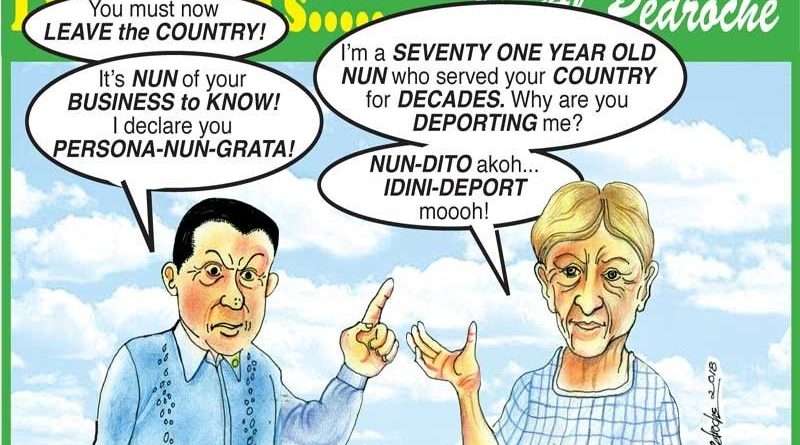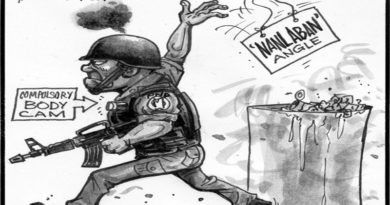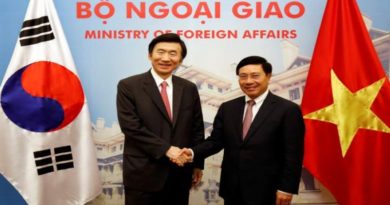COLUMN-OPINION: OPINION ON PAGE ONE- ‘Deport the sex tourists, not the missionaries’ By Fr. Shay Sullen, SSC
DUBLIN, Ireland: There are as many as 16,000 Filipinos, or more, living and working and earning just and good wages in Ireland. There are 4,265 who are nurses and thousands more are caregivers or in other professions.
They are welcomed, trusted and highly respected here and they send their hard-earned money back to the Philippines to support their families. They are caring, trustworthy and dedicated to their profession and loved by the people of Ireland. They are key employees in the Irish health system. Many church communities are inspired by the Filipino choirs as most are faithful to their Christian faith and attend church. The Filipino Muslims abroad are faithfully going to the mosque.
Overseas workers endure the loss of being with their families in the Philippines but they sacrifice themselves to earn a living and support their children and parents. The Philippine economy is said to be growing at an estimated 6.4 percent, although the accuracy of the figure is hard to confirm, yet the unemployment situation is dire and millions of Filipinos have had to leave home to find a decent paying job.
Deplorably in the Middle East, some of them suffer abuse and exploitation by unscrupulous employers in situations where they are victims of human trafficking, sexual abuse, or are even murdered. There are 600 Filipinos in shelters at the Philippine Embassy in Kuwait, where they reside having been rescued from their places of employment by embassy staff in a controversial move that angered the Kuwaiti authorities.
There will be an agreement signed soon between Kuwait and the Philippines, whereby the rights and dignity of the 170,000 Filipinos working there will be protected and respected, we hope. It is so important for the government to protect the rights of the OFW. In every country in the world, working Filipinos are found and they are well accepted and respected in most. Filipinos working abroad send cash remittances of about $30 billion a year to the Philippines, contributing largely to the country’s economic growth and government operations.
Most of the foreigners in the Philippines are employees of multinationals or local business corporations, or investors in sex bars and clubs that exploit Filipinos shamelessly. They seem to enjoy impunity from drug raids or rescue missions by government authorities. The women in Kuwait were rescued under the noses of the Kuwaiti authorities. Here in the Philippines, the abuse and exploitation of young Filipino women and children and drug use is generally tolerated. It is mostly non-government agencies that rescue and save some of the victims.
The other foreigners are those missionaries who have come to serve the Filipinos. They are unpaid volunteers and they, too, have sacrificed their normal lives of having a family and children of their own, along with the simple comfort of being in their home country and in the company of relatives. They sacrifice their lives to work among the poor and the oppressed without pay. They do so out of love and solidarity with the oppressed, abused, deprived Filipinos in areas of hardship. They risk their well-being and several have been killed and kidnapped over the years. They deserve recognition for doing the work of defending the exploited, abused and victims of human rights violations. This is the work of government social services, which is lacking, and this is where the charitable volunteers step in by showing compassion, concern and bringing relief and help. But they are sometimes branded as being engaged in “political activism.”
Sister Patricia Fox, 71, an Australian, serving the poor for 27 years, is superior of the Sisters of Notre Dame de Sion in the Philippines. She was arrested by immigration officials a few weeks ago and brought to the Bureau of Immigration for investigation and questioning. Her missionary visa has been revoked and she will be deported in 30 days. She is accused of engaging in “political activities” for being an advocate of human rights and the rights of oppressed farmers and indigenous people in Mindanao. She was threatened with deportation because of such accusations.
Opposition lawmakers issued a statement in her defense, saying, “Helping the poor is not a crime and joining peaceful activities to advocate peasant welfare and human rights is not against the law.”
They called on the government to release her immediately. After some time, she was released and was not deported.
When serving the poor and protesting human rights violations becomes a crime and branded wrongly as political activity, then that is a black day for Philippine democracy and is a slide toward tyranny and greater oppression.
All who believe in mercy, compassion and justice are called by their faith and their commitment to the values of Jesus of Nazareth to imitate him and take a stand for what is right and denounce any oppression or violation of such values. It is a matter of witnessing to our faith by being prophetic and doing what our faith calls us to do.
Faith without action is dead. Taking a stand for life is being alive and human. We must not be afraid to challenge wrongdoing or be intimidated by the wrongdoers.
The people that need to be investigated by the Bureau of Immigration are those foreigners who are overstaying, bribing officials and allowed to run sex bars and exploit young women and minors with impunity, not those missionaries who are serving the poor.
www.preda.org
/ All photographs, news, editorials, opinions, information, data, others have been taken from the Internet ..aseanews.net | [email protected] |.For comments, Email to :D’Equalizer | [email protected] | Contributor.










